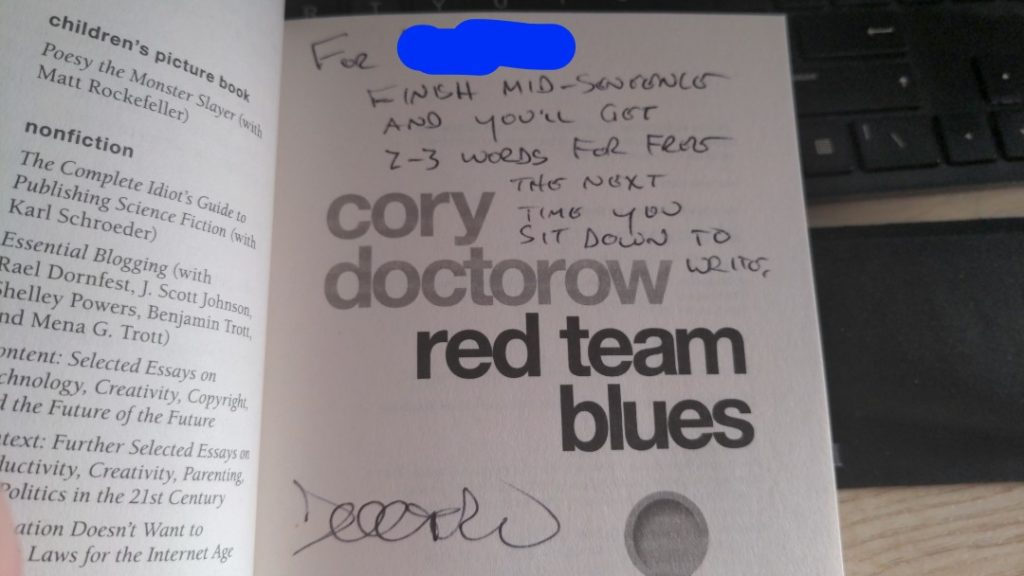- I tried to read Getting Things Done. It’s a slog, but it does have one thing worth remembering;
- Productivity is about being more deliberate about what you do, not about doing more;
- Whenever we see a piece of productivity advice, we should ask – “Productivity to what kinds of political ends?”
- I’m writing a story. Maybe I’ll publish it one day…
Per Cory Doctorow’s post re: the birth of lifehacking in 2004, I thought I’d give David Allen’s ‘Getting Things Done’ the courtesy of being read. For what it’s worth, the passion is clearly there, and Allen clearly is devoted to the idea that what he’s preaching is part of something bigger, and more important. What he writes about is important. But good lord, is it full of utter gibberish sometimes.
Getting Things Done has become one of those self-help books, where the meat and potatoes are best served in masticated form1 – that is, from other people who’ve read it. It’s a page-turner, for sure – I turn the pages to find some cohesive concept planted on terra firma. There’s only so much ‘be like water’ I can take before I’m reminded that a large portion of the human body is comprised of water. I already am water, Dave. 70% of me, at least…
Still, as Doctorow writes, productivity and lifehacking are in bad odour these days, and for good reason – it ain’t what it used to be. He knows this, because he is, from the perspective of lifehacking’s lifespan, a boomer. He was literally there when it was born, just over twenty years ago:
https://pluralistic.net/2024/01/25/today-in-tabs/
I’ve taken a few potshots at productivity junkies before on Brologue. The key thing (for me) to remember is that productivity, as a concept, is a kind of ideological vessel that one fills to represent an ideal. It’s fair to recoil in response to some grifter’s idea of productivity as a means to capital’s end. Productivity porn is an abstract kind of perversion.
What sorts of productivity porn, exactly? I think Anne-Laure Le Cunff of Nesslabs’s short list suffices:
https://nesslabs.com/productivity-porn
Mentioning Tim Ferriss’s 2007 book, The 4-Hour Workweek put me in mind of this excellent mini-analysis from Tom Nicholas’s video, Griftonomics: Why Scams Are Everywhere Now:
From our perspective, it’s too easy to be cynical about 4-Hour Workweek as just another grifter’s bible. However, as Nicholas rightfully points out, it was written in response to the exact same cultural anxieties about work that would later be addressed by writers such as David Graeber, who Nicholas also quotes:
It’s as if someone were out there making up pointless jobs just for the sake of keeping us all working.
https://davidgraeber.org/articles/on-the-phenomenon-of-bullshit-jobs-a-work-rant/
4-Hour Workweek agrees with us that there is a problem (or are problems) with work; what we disagree on is how to fix things, what those solutions might look like, what we want from those solutions, what even needs to be fixed, and so on. We’re not so different, except where we are different, and by that, I mean we’re different in many areas. But at least we’ve admitted there’s a problem.
I dislike productivity porn. I got spiritually bezzled one too many times during the pandemic, and it left an ascorbic taste in my mouth. Despite all that, it would be a mistake to eschew productivity entirely as something to avoid. As I came to realise writing for this blog, there is a non-zero chance that someone out there is using some productivity tricks to bring about the Revolution™:
https://brologue.net/2024/01/06/thought-i-d-something-more-to-say/
In Slavoj Žižek’s 2012 film, The Pervert’s Guide to Ideology, there’s a section where he analyses Beethoven’s 9th Symphony as a general song of celebration that has been co-opted by just about every major political movement thereafter it was written – on the left and on the right:
Later in the film, we arrive at his analysis of the song ‘Tomorrow Belongs to Me,’ from Cabaret (1972). With some slight rearranging and rewriting, he claims, one could easily imagine this not as a fascist call for solidarity, but an anti-fascist anthem, instead:
We should be here very precise, not to fall into the usual trap of disqualifying all elements out of which the N*zi ideological edifice is composed – to disqualify those as proto-fascist… The N*zis directly took these over from social democracy, from the left… Let me just take some other concepts from the N*zi worldview: The solidarity of the people – my god, there is nothing bad in this notion as such. The problem is solidarity to what kind of people?
If I eschewed all forms of productivity as some sort of grifting ploy, then I would, as Žižek famously opens his film with, be eating from the trashcan of ideology all the time. This is what I mean when I say productivity gets thrown about as an ideological vessel: What kinds of productivity, and to what kinds of political2 ends?
As an ADHD person, finding ways to become more deliberate about what I do is of far greater importance – there are a lot of things I want to do before my time is up, and of the things I want to do right now, I can’t help but hyperfixate on them. Like, for instance, playing video games, or keeping a journal:
https://brologue.net/2024/02/18/ludocrous/
https://brologue.net/2023/12/26/my-spines-as-stiff-as-a-prosthetic-leg/
Sometimes, when I’m not using it as a retainer for Brologues-in-baking, I grow my Zettelkasten with new nuggets of knowledge:
https://brologue.net/2023/11/04/zettelkasten-an-antidote-for-boring-notes/
That’s really what lifehacking was supposed to be about. It was never about doing more and more and more, until your fingers fell off, nor to become so burnt out that you could scatter yourself to the wind. Witnesses to lifehacking’s birth can tell you with confidence that productivity was about being more deliberate about what you do.
A journal hasn’t made me magically do more, but it has made me more deliberate in keeping in touch with myself, and things I try to get done from day to day. After backing Doctorow’s latest book, The Bezzle, I asked him to sign3 with any words of encouragement for aspiring writers. Here’s what he wrote me:


I usually power through until I get to the end of a paragraph that I don’t know how to continue. Honestly, finishing mid-sentence makes more sense from a dialogical perspective. It’s something we tend to do a lot; Gillian Tett, who I mentioned in my last post, spent some time in Japan, where running off each other’s sentences is far more explicit:
https://www.bbc.co.uk/sounds/play/m001wjf9
I suppose now is a better time than never: I’ve had a story I’ve been writing on-and-off in fragments for over two years. It’s nowhere near finished, and I haven’t actually joined those fragments up yet, but my hope is that it might get published someday. I haven’t been writing it every day. I ought to.
There’s an archetype of character in Shakespeare that I don’t think has been explored enough: the messengers. Have you ever noticed how they move the plot along by their ability to give the main characters information almost instantly and when the plot demands it?
My story is a chess-themed fantasy where the main character, a Pawn, is a courier who’s built a reputation for quick deliveries. There’s the mystery: no-one knows how he does it. Even he doesn’t know. He’s not a particularly fast runner, he’s flat-footed, and – this really gets the imagination of his higher-ups going – he’s a dwarf.
His reputation as a runner lands him a royal gig with the White King, who wants a package delivered to his opposite number. He’s none too happy about his runner being a Pawn:
The King rolled his eyes pre-emptively. "One of Roy Ó Clubs's boys, as I recall," he said, "Managed to swindle old Postmaster Stony Brook into letting a Pawn muck around. Remarkable young man, so I'm obliged." "The first thing most people tell me is that he's a dwarf," said Ernest [The King's senior advisor]. "And the first thing you told me is he's one of the best." "Well, Roy's always thought himself as being ahead of the curve with finding talent." The King shook his head and chuckled mockingly. "He does say that. He's full of himself. He knows I've never liked his idea of 'diversity hire.'" "Knows you've never liked him," Ernest added quickly. "But he's good at what he does," the King rallied back, "He's earned his hubris." "One of the Board's Clever Dicks, you said to put in his notes." "But it's not about him, see," said the King suspiciously, "It's too high-brow a job for Pawns. I told him, put the lad to a job like that, and it'll be the Big Ideas soon enough. But no, no, said Roy, he does as he's told, no ideas above his station. And now, he's my runner."
Again, to finish off – not all productivity is bad. When we see such advice, we should stop and ask, “productivity for what kinds of ends?” What kinds of ends do we expect ourselves to use them to? That’s where I inquired further, and came to the conclusion that I’d had it wrong.
- Or, as is usually served in Scotland, stovies. ↩︎
- Here I refer to politics in its broadest sense: actions one takes to try and directly influence the actions of others. ↩︎
- And here is where I got to in this post last night, before continuing the rest this morning. I can’t say I don’t take advice when I get it. ↩︎
